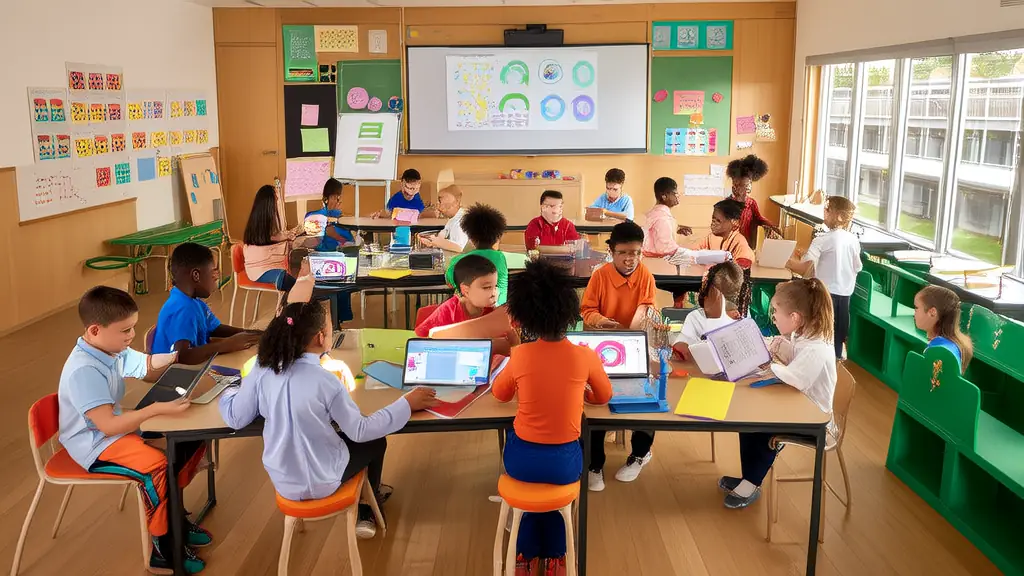
Empowering the Future: Navigating K12 Education in 2025
Welcome to our exploration of the dynamic world of K12 education. As we stand on the brink of a new era, it's crucial for both parents and educators to stay informed about the latest trends, methodologies, and technologies shaping the educational landscape. In this blog post, we will delve into the most effective teaching strategies, recent child development insights, emerging educational technology, and practical tips that can make a real difference. We'll also share some inspiring success stories that highlight the transformative power of modern education.
The Power of Inquiry-Based Learning
Inquiry-based learning (IBL) has gained significant traction as a highly effective teaching methodology. This approach encourages students to ask questions, explore, and investigate, rather than passively receiving information. By fostering curiosity and critical thinking, IBL helps students develop a deeper understanding of subjects and enhances their problem-solving skills.
Example: A middle school science class might start with a question like, "How does water pollution affect local ecosystems?" Students would then conduct experiments, gather data, and present their findings. This hands-on, investigative approach not only makes learning more engaging but also prepares students for real-world challenges.
Actionable Advice: Teachers can incorporate IBL by designing lessons around open-ended questions and providing resources for students to explore. Parents can support this at home by encouraging their children to ask questions and seek answers through research and experimentation.
Child Development Insights and Research
Recent research in child development has shed light on the importance of social-emotional learning (SEL) and its impact on academic performance and overall well-being. SEL focuses on developing self-awareness, self-management, social awareness, relationship skills, and responsible decision-making. These skills are essential for students to navigate the complexities of life and build strong, supportive relationships.
Example: A study by the Collaborative for Academic, Social, and Emotional Learning (CASEL) found that students who participated in SEL programs showed an 11% increase in academic achievement and a 9% improvement in behavior. Schools that integrate SEL into their curriculum often see a positive shift in school climate and student engagement.
Actionable Advice: Educators can incorporate SEL into daily activities by using structured activities and discussions that promote these skills. Parents can reinforce SEL at home by modeling and discussing emotions, empathy, and conflict resolution.
Educational Technology Trends
Technology continues to play a pivotal role in K12 education, offering innovative tools and platforms that enhance learning experiences. Some of the key trends include personalized learning, virtual and augmented reality (VR/AR), and artificial intelligence (AI) in education.
Personalized Learning: Adaptive learning platforms use AI to tailor content and pacing to each student's needs, ensuring that no one is left behind. For example, DreamBox Learning provides math instruction that adjusts to individual student progress, making learning more efficient and effective.
Virtual and Augmented Reality: VR and AR technologies create immersive learning environments that bring abstract concepts to life. For instance, Google Expeditions allows students to take virtual field trips to historical sites, museums, and even outer space, providing a rich, interactive learning experience.
Actionable Advice: Teachers can integrate these technologies into their lesson plans to make learning more engaging and accessible. Parents can explore educational apps and online resources that complement classroom learning and provide additional support at home.
Practical Tips for Parents and Teachers
Both parents and teachers play a vital role in supporting students' educational journeys. Here are some practical tips to help you make the most of the opportunities available:
- Stay Informed: Keep up with the latest research and trends in education. Attend workshops, webinars, and conferences to expand your knowledge and network with other professionals.
- Communicate Effectively: Maintain open lines of communication between home and school. Regularly discuss your child's progress, strengths, and areas for improvement with their teachers.
- Create a Supportive Environment: Foster a positive and nurturing environment at home and in the classroom. Encourage a growth mindset, celebrate achievements, and provide constructive feedback.
- Encourage Exploration: Support your child's interests and passions. Provide opportunities for them to explore new hobbies, join clubs, and participate in extracurricular activities that align with their interests.
Success Stories and Case Studies
Let's look at a few success stories that highlight the impact of modern teaching methodologies and technologies:
Case Study 1: The Success Academy Charter Schools
The Success Academy Charter Schools in New York City have achieved remarkable results by implementing a rigorous, inquiry-based curriculum. Their focus on critical thinking, collaboration, and problem-solving has led to high levels of student engagement and academic achievement. According to a 2024 report, 100% of their graduates were accepted into four-year colleges, demonstrating the long-term benefits of this approach.
Case Study 2: The Khan Academy Partnership
Khan Academy, a non-profit educational organization, partnered with several school districts to provide personalized learning resources. In a pilot program, students who used Khan Academy saw a 20% increase in math proficiency compared to those who did not. This success underscores the potential of technology to bridge gaps and provide equitable access to quality education.
Conclusion
As we continue to navigate the ever-evolving landscape of K12 education, it's clear that staying informed and adaptable is key. By embracing the latest teaching methodologies, leveraging educational technology, and prioritizing social-emotional learning, we can empower our students to thrive in the 21st century. Whether you're a parent or an educator, your role in supporting and guiding the next generation is invaluable. Let's work together to create a brighter, more inclusive future for all learners.
For more resources and to stay updated on the latest developments in K12 education, be sure to follow our blog and connect with us on social media. Together, we can make a difference!